Affiliate Disclaimer
Some links in this article are affiliate links. We may earn a small commission if you make a purchase through these links, at no extra cost to you. We only recommend products we find useful to our readersSo, you slept through your alarm again? Have you either questioned yourself why this is happening to you and how to stop sleeping too much? If not, do it now.
What answers did you get? “Ahh, work was very hectic yesterday.” Or “I couldn’t sleep till 3 in the morning.” What was your reasoning?
In this article, we are going to delve into the oversleeping causes, oversleeping side effects as well as the different ways to avoid oversleeping for a healthier lifestyle and well being.
Is Sleeping Too Much Bad For You?
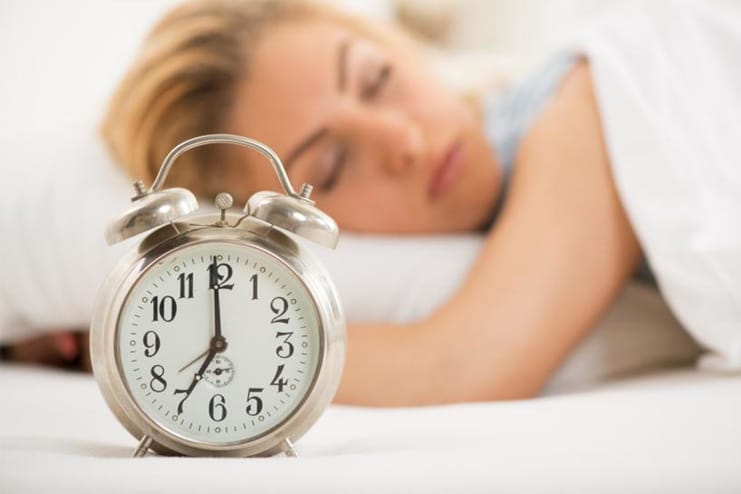
With the dynamics and impacts that sleep has on our daily life, this field of research is gradually gaining momentum and importance. But, what are the implications? If sleeping too much actually bad for you?
And the answer is yes, it is. There is a reason why there is a standard time frame even for the maximum hours of sleep that one should get. It is quite necessary to follow the same, mainly because of the fact that it is what affects our overall biological clock and the circadian rhythm that controls our sleeping cycle.
So, once that rhythm and cycle is affected negatively, the same ends up impacting the overall sleeping schedule and not only will you end up sleeping at odd times throughout the day, there are possibilities that you will end up oversleeping and that sure does impact the quality of time. While many people might not take it seriously, sleep plays a very crucial role in the overall well being of an individual.
It is thus very important to maintain a harmony between how much you are sleeping which shouldn’t cross the 7-9 hours mark in a day.
How Much Sleep Is Too Much Sleep?
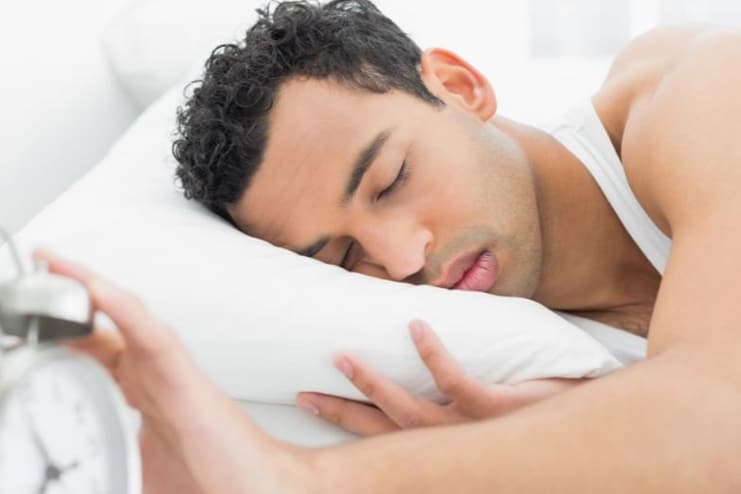
When it comes to how much sleep is too much sleep, the answer is anything that extends the 9 hours mark in a day. If you are here wondering whether you are sleeping more than what you should, read on.
Many people get confused that oversleeping might actually end up impacting their lives if they do it once or twice every once in a while. That is not how the same works. When your sleeping cycle is crossing the 9-hours mark every single day and that too, persistently, that’s where the problem arises.
Sleeping in a few more hours during the weekends is no big deal but doing so every single day is when the problem arises. Studies conducted by the researchers from the University of Arizona stated that the lowest rate of morbidity and mortality lies when people sleep for 7 hours.
Sometimes, your answer to “Why I am sleeping too much?” maybe because of an underlying health condition which is why it is necessary to get the problem checked out if the condition persists.
“Why Am I Sleeping Too Much?” Causes of Oversleeping
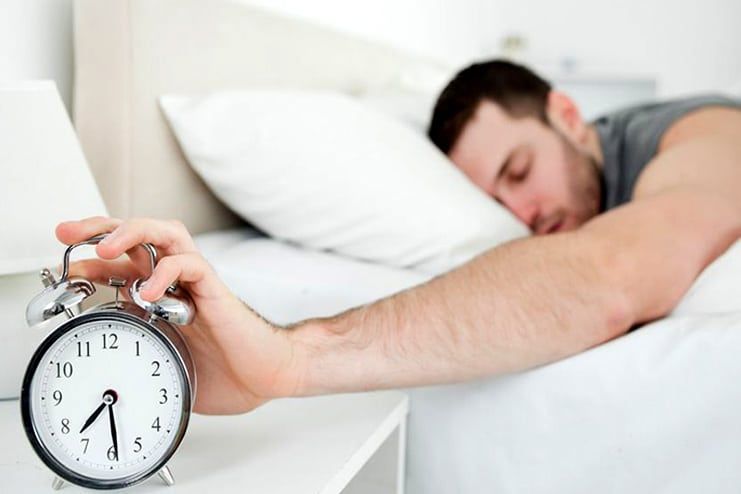
While the majority of us tend to understand that there is an actual problem when we are oversleeping and tend to brush away the same as something as trivial as stress or something else, it is time to address the problem and actually, make impactful changes that would help better your quality of life and overall well being.
So, let us look at some of the oversleeping causes that you might not be aware of:
1. Lack Of Proper Sleep

This is what makes up for the majority (70%) of the reasoning behind why you are actually oversleeping most of the days. If you are not indulging in necessary and much required sleep at night, there are chances that you won’t be able to wake up during the mornings.
Now, what is the cause behind poor sleep is yet another question that often pops up.
There can be a number of reasons behind your lack of sleep during the night; it could be anything affecting your overall well being and some underlying health condition to something along the lines of hormonal disintegration.
We often tend to expose ourselves to the direct blue light during the night while using our mobiles or laptops. This has a very destructive impact on the overall secretion of melatonin in the body which ends up preventing you from getting a proper night’s sleep.
Even having long naps during the odd times throughout the day end up affecting the sleeping cycles in individuals. It is necessary that you pay off your “sleep debts” and ensure that the total hours of sleep that you are getting throughout the day doesn’t cross the 7-9 hours mark.
2. A Distorted Sleeping Schedule
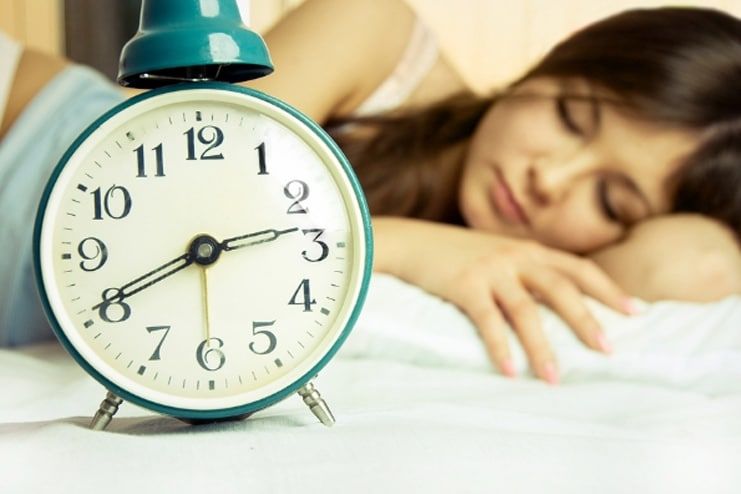
As mentioned before, our body’s biological clock and circadian rhythm is very important to manage and maintain because any kind of distortion in the same is what ends up causing problems with the overall sleeping schedule.
This is why people who work in rotational shifts have a very hard time catching the correct amount of sleep that is beneficial for them and either undersleep or oversleep. If you want to avert the oversleeping side effects, it is important to have a manageable sleeping schedule because that is what impacts the overall quality of sleep.
3. Poor Diet
 Many people often tend to not understand this but your sleep is dependent on how your body is working, so if the metabolism and other functions of the body are hampered, there are chances that it will end up impacting the overall sleeping cycles and end up contributing to the sleeping too much causes.
Many people often tend to not understand this but your sleep is dependent on how your body is working, so if the metabolism and other functions of the body are hampered, there are chances that it will end up impacting the overall sleeping cycles and end up contributing to the sleeping too much causes.
Consuming foods rich in grease, oil, calories and Trans fat reflects on the overall well being of an individual. These tend to end up impacting the overall health and make you feel tired and fatigued all the time which is often times the reason behind the oversleeping.
4. Issues With Mental Health
 Consistent impacts on one’s mental stability are also a prime contributing factor to oversleeping. If you are here wondering how to avert the effects of oversleeping, it is time to look into the factors that are affecting your overall psychological well being.
Consistent impacts on one’s mental stability are also a prime contributing factor to oversleeping. If you are here wondering how to avert the effects of oversleeping, it is time to look into the factors that are affecting your overall psychological well being.
Sometimes, it is not always the lifestyle, diet and the physiological aspects that impact one’s overall sleeping cycle. If you are depressed or having been under a lot of stress, it is most likely that you will feel too tired to move or somehow end up being a night owl and not sleeping the entire night which ends up making you oversleep in the day.
What Are The Effects Of Oversleeping?
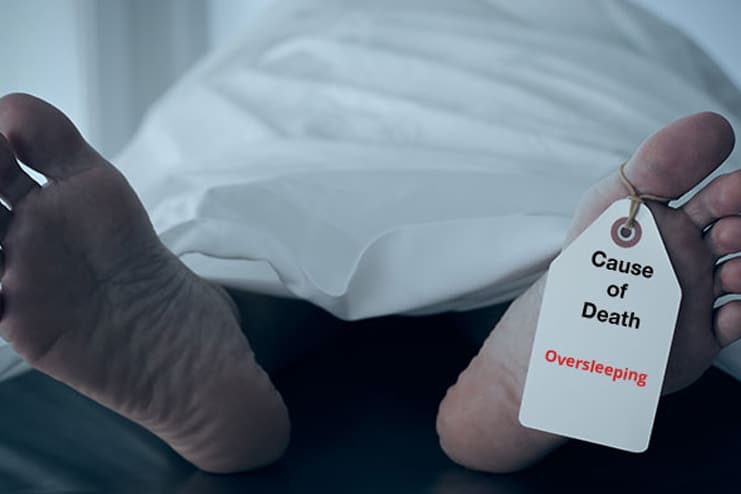
Why the dramatics with the picture above might seem like a bit too much, it is quite actually the end game and the impact your experience and even researchers have affirmed these claims.
So, how is oversleeping and one’s overall well being intertwined? Let’s take a look, shall we?
1. Oversleeping Impacts Brian And Cognitive Functions

The brain is one of the most important organs of the body which is responsible for managing and operating the maximum of the body functions. Oversleeping ends up impacting the brain functions, causing impairments in the cognitive abilities.
If you are wondering why, it is because sleep is the time when the brain tends to get rid of the toxins and byproducts, balances the levels of neurotransmitters and also consolidate both the short-term and long-term memory (R).
Any kind of hamper to the time frame be it less or even more, ends up impacting the functions carried out by the brain which is why it is necessary to maintain the proper timings for sleeping.
Oversleeping side effects often include depression and consistent fatigue and also as a contributing factor to a number of degenerative diseases. Many studies have implied oversleeping as a possible reason behind depression. It has been witnessed that a distorted sleep cycle is often times the main reason behind the affected mental health which can be brought back on track with a healthy sleeping schedule.
2. Inflammatory Problems

Internal inflammation in several body parts can be very harmful for the overall body and end up being an obstruction to a number of normal body functions.
In a conducted study (R), it was found that people (both male and female) who had the tendency of oversleeping were more prone to having inflammatory issues in their body. The cytokines in the body is what causes inflammation and people who have elevated levels of C-reactive proteins (CRP) were more likely on the risk of having inflammation in their body.
Two other studies (R) (R) have also confirmed that link between oversleeping with the elevated levels of CRP in the body which inadvertently contributes to the increased rate of inflammation in the body.
3. Enhanced Levels Of Pain

Yet another one of the oversleeping side effects is that intensifies the rate of pain. There are often times when we feel like the pain will subside if we sleep it off or become inactive because of the same. Oversleeping does have the completely opposite impact than what one expects from the same.
Especially back pain, it can get worse with little to no activity and make the muscles stiff and contribute to making the pain even worse than actually curing it.
Not just that, the saying that “too much sleep headache” is actually a thing because it has been witnessed that excess sleep ends up triggering migraine as well as tension headaches (R). Oversleeping with the combination of caffeine withdrawal or added stress is what is believed to be a contributing factor to the pain.
4. Impact On Fertility
 Studies have been conducted that imply how the lack of sleep or even oversleeping ends up impacting the overall hormonal balance in the body which contributes to impaired fertility.
Studies have been conducted that imply how the lack of sleep or even oversleeping ends up impacting the overall hormonal balance in the body which contributes to impaired fertility.
In a Korean study (R) specifically, it was found that the women who had the optimum amount of sleep (around 7-8 hours) had the best possibility of conceiving a child followed by moderate sleepers (53%) and the least chances for the ones who sleep more than 9 hours in a day (43%).
It is the correlation between the distorted hormonal levels with the circadian rhythms (R) which end up causing the problem in the first place.
5. Affects Glucose Tolerance And Risks Of Diabetes
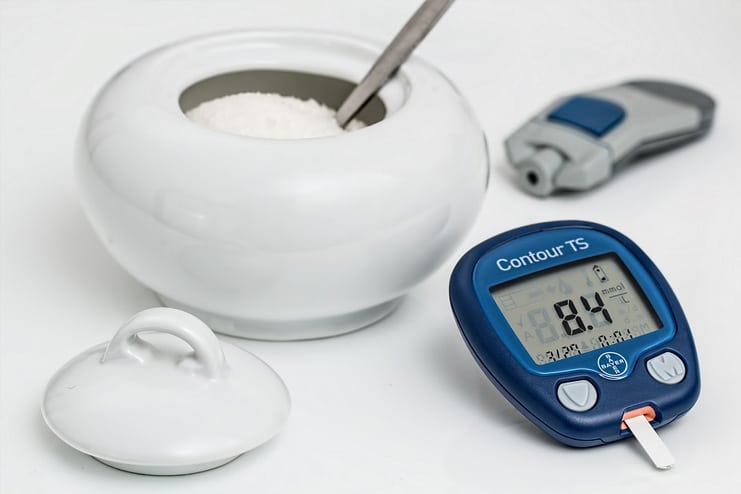 Diabetes and glucose tolerance are two yet important factors that are considered as oversleeping side effects. Impairment in the process of glucose tolerance ends up contributing to the condition of insulin resistance which heightens the risk of diabetes.
Diabetes and glucose tolerance are two yet important factors that are considered as oversleeping side effects. Impairment in the process of glucose tolerance ends up contributing to the condition of insulin resistance which heightens the risk of diabetes.
There has been a conducted study (R) over a time period of six years to establish a relationship between how sleeping patterns influence the glucose tolerance in the body to which they found that the same actually ends up being impaired with longer duration of oversleeping.
Even a recent study (R) has established the effects of long and short term sleep with the enhanced risks of diabetes, especially Type-2 diabetes.
6. Risks Of Obesity
 The correlation between weight gain and excess sleep doesn’t necessarily require any extra input, now, does it? It is not just the people who slept more but even the short sleepers have an inclination towards have a tendency of gaining more weight (R), mainly because of the fact that it tends to directly influence the metabolism of the body, which ends up inflicting negative impacts on the body.
The correlation between weight gain and excess sleep doesn’t necessarily require any extra input, now, does it? It is not just the people who slept more but even the short sleepers have an inclination towards have a tendency of gaining more weight (R), mainly because of the fact that it tends to directly influence the metabolism of the body, which ends up inflicting negative impacts on the body.
Not just that, the effects of oversleeping also skirts around the heightened risks of diabetes and inflammation which further have contributing impacts on the overall risks of weight gain and obesity.
7. Increased Risks On Cardiovascular Health

Studies have also shown a heightened risk of several coronary diseases and stroke (R) in individuals who tend to either not sleep the amount they should or end up sleeping more than what they should.
Although there is no clear reasoning behind why the same is persistent in such individuals, researchers believe that it could very well be because of the constant labored rate of metabolism and the heightened risk of diabetes that could end up impacting the heart health of an individual.
How to Stop Sleeping Too Much?

If you have been meaning to get rid of oversleeping once and for all, there are actually quite a few ways in which one can achieve the same. Becoming a morning riser abruptly is not something that happens overnight, it does take time to build the habit gradually but once you get used to the same, the process is quiet easier than you can even imagine.
If you have been seeking ways on how to stop oversleeping, there are a few effective methods that can help bring your sleeping schedule back on track from being haphazard and all over the place.
Some of the most effective ways on how to stop sleeping too much include:
1. Get Adequate Amount Of Sleep
 If you want to avoid oversleeping, it is mandatory that you have a good night’s sleep. And it is not just about the amount of sleep that you get, you can sleep for 7 hours but if the quality of sleep is not good enough, there are chances that you will end up either oversleeping or tired throughout the entire day.
If you want to avoid oversleeping, it is mandatory that you have a good night’s sleep. And it is not just about the amount of sleep that you get, you can sleep for 7 hours but if the quality of sleep is not good enough, there are chances that you will end up either oversleeping or tired throughout the entire day.
While adults need a maximum of 7-9 hours of sleep, it is mandatory for the teens to at least have 9 hours of sleep every single day to help boost their energy levels and to ensure that they are not tired throughout the day.
2. Keep The Distractions Away
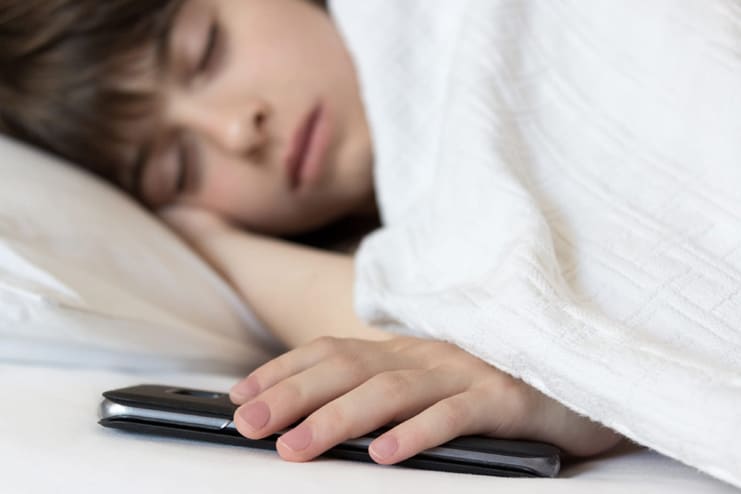
And by that I mean, No phones or other forms of distractions to the bed. This might often seem like a drawback but trust me; it works wonders on impacting your sleeping cycle and your overall quality of sleep. If you are here wondering what is it that is affecting the sleep, it is these electronic gadgets that end up affecting your quality of sleep.
Exposure to blue light ends up disturbing the balance in the secretion of melatonin in the body which prevents you from falling asleep which, in turn, ends up making you oversleep through the day more than you should.
Try and ban any form of distractions if you have been thinking why I am sleeping too much. Keep the bed restricted for sleeping and sexual activities, that’s what majority of the doctors suggest.
3. Become A Morning Riser

If you have been oversleeping for the most part of your life, it would definitely be quite hard for you to just switch habits and become an early riser. That’s not how it works, and that is not possible for the circadian rhythm of the body too.
In order to get rid of oversleeping, you need to get up early every day and make that into a routine that you stick that. This is the most important part. Sticking to the routine is very important because that is what ends up making it a habit for you to become a morning person effectively.
Waking up early has a number of health benefits which can help you lead a very healthy well being and boost your overall energy as well.
4. Make Changes To Bedtime As Well

It is not just how early you wake up that is an answer to how to stop sleeping too much, when you go to bed is equally important which is why it is important to maintain a balance of the both. Much like how you don’t become a morning person all of a sudden, you don’t start going to bed early as well. Even that is a work in progress.
Start with gradually bringing forth the bedtime a little by little every day till it becomes suitable enough and make that a routine then.
5. Healthy Eating And Mealtimes
 It is very important to have a set meal plan, one that includes a very healthy diet. Just eating for the sake of eating won’t really turn good for you because the same ends up impacting the overall health.
It is very important to have a set meal plan, one that includes a very healthy diet. Just eating for the sake of eating won’t really turn good for you because the same ends up impacting the overall health.
Start making healthier choices when it comes to what you put in your belly and make sure that the meals are spaced our correctly and eaten at the right time of the day to ensure that same doesn’t negatively impact the metabolism or digestion of the body.
Make sure that you are not eating and jumping in the bed for your night time. This ends up affecting the metabolism which makes you lethargic and you end up oversleeping.
6. Indulge In Some Exercise
 Often times, one of the main oversleeping causes is because of the sedentary lifestyle that we lead. Not having a dose of physical activity often ends up affecting our overall health and lifestyle and impacts the overall metabolism of the body and lowers the energy levels which makes up feel tired and thus end up sleeping more than you should.
Often times, one of the main oversleeping causes is because of the sedentary lifestyle that we lead. Not having a dose of physical activity often ends up affecting our overall health and lifestyle and impacts the overall metabolism of the body and lowers the energy levels which makes up feel tired and thus end up sleeping more than you should.
If you have been seeking ways on how to stop oversleeping, the best way to do so is by waking up early and indulging in a quick 30 minutes of work out of any kind that helps in boosting the energy levels in your body. It doesn’t necessarily have to be somewhere along the lines of heavy cardio, even 30 minutes brisk morning walk is just as beneficial.
Instead of leading a sedentary lifestyle, switch and make healthy choices.
7. Prioritise Sleep

Yes, I am telling you to choose to sleep first. Majority of the times we are so engrossed with everything else surrounding us that we fail to prioritise sleep. If your daily schedule is preventing you from providing you with at least 7-8 hours of sleep every day, it is time to change that for good.
Change and declutter your schedule and then start with making healthier choices. Whatever the work or stress be, it is important that you leave that behind before bedtime and change the schedules accordingly for similar results.
8. Prevent Napping In Late Day

Napping during the day often ends up causing problems in letting you sleep at night which is the last thing you want if you want to get rid of oversleeping. It is mandatory to ensure that you avoid longer naps during the late day because this disrupts your sleep wakefulness cycle in the morning and prevents you from sleeping in the night when you are actually supposed to.
When you end up sleeping late at night, it tends to affect your entire sleep cycle, making you oversleep the day after. Prevent napping for longer periods of time and instead switch for easier power naps for better overall well being.
9. Manage Stress
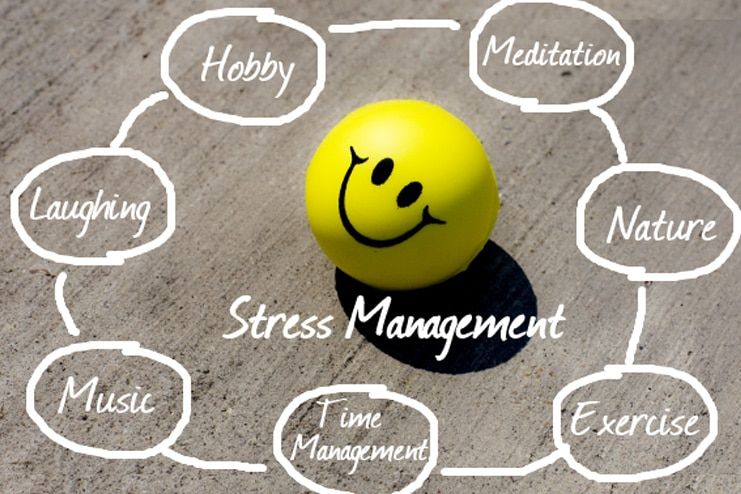
Stress and the levels of cortisol in the body is one of the predominant oversleeping causes. If this is something which has been averting your sleep cycles and prohibiting you from having a good night’s sleep, now is the time to make changes to the same and opt for other options that are healthier for you.
Stress management is not just essential for you to get a good night’s sleep and to be an answer to how to stop sleeping too much but it helps boost the overall well being and quality of life of an individual. the moment you learn how to strategically manage your stress, you can very well channel all your problems easily and make better decisions and choices that in turn, affect your life too.
10. Avoid Alcohol Before Bedtime

People have this preconceived notion that alcohol makes you drowsy and sleepy but the reality is quite the opposite of the same which is why it is always best to avoid drinking alcohol if you have been trying to get rid of the effects of oversleeping that’s impacting the quality of life.
The alcohol may make you feel dizzy and drowsy temporarily but when the impacts of the alcohol wears off, the same leaves you completely awake and alert which affects your quality of sleep and makes you feel tired.
11. Consult A Sleep Specialist
 If nothing works out in the end, it is necessary to reach out to a specialist to get the symptoms checked out for any kind of underlying health ailments that might be making you tired and inducing oversleeping. This is quite a very common reason behind the same which is why it is necessary to ensure that you seek the necessary help and not just take the symptoms for granted.
If nothing works out in the end, it is necessary to reach out to a specialist to get the symptoms checked out for any kind of underlying health ailments that might be making you tired and inducing oversleeping. This is quite a very common reason behind the same which is why it is necessary to ensure that you seek the necessary help and not just take the symptoms for granted.
There are several sleep specialists around and if you seem to not have access to them right away in your area, you can even consult a general physician and then get the necessary referrals from them.
When it comes to how to stop sleeping too much, there are predominantly a number of ways to do so but given the fact that the causes might vary from person to person, it is important to first source what the problem is and then opt for the salient way to get rid of the signs and symptoms accordingly.
In this Article















